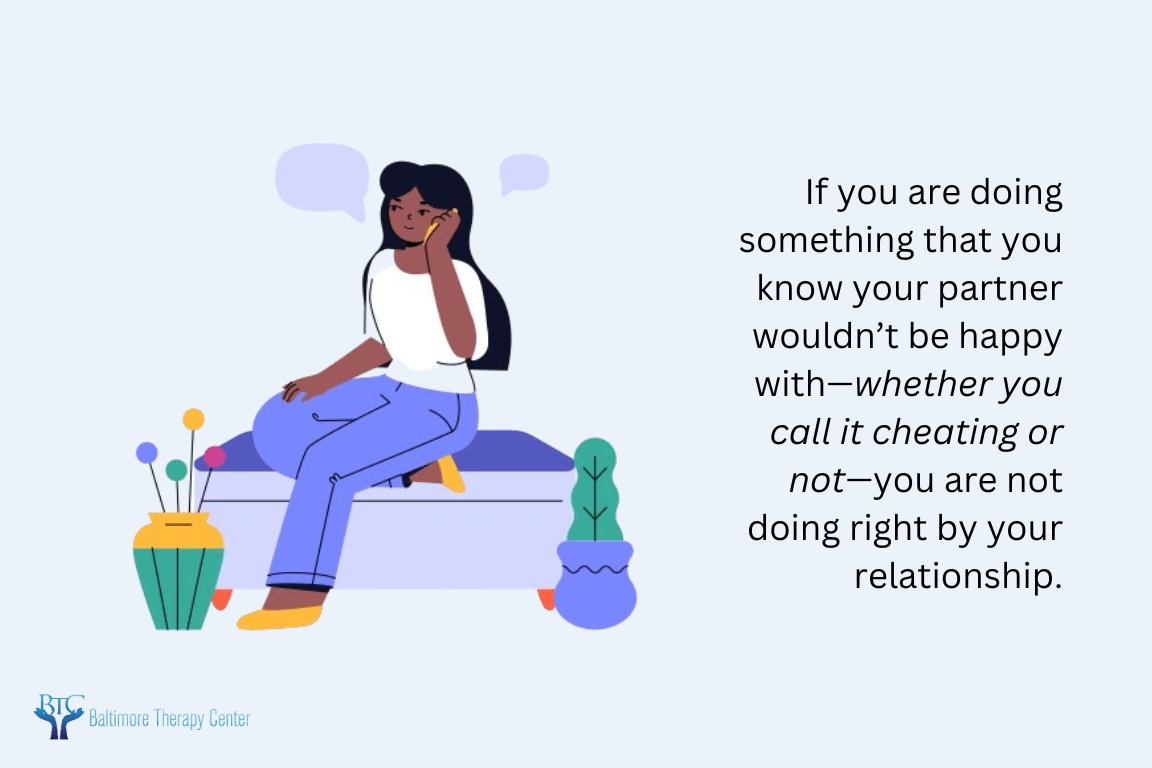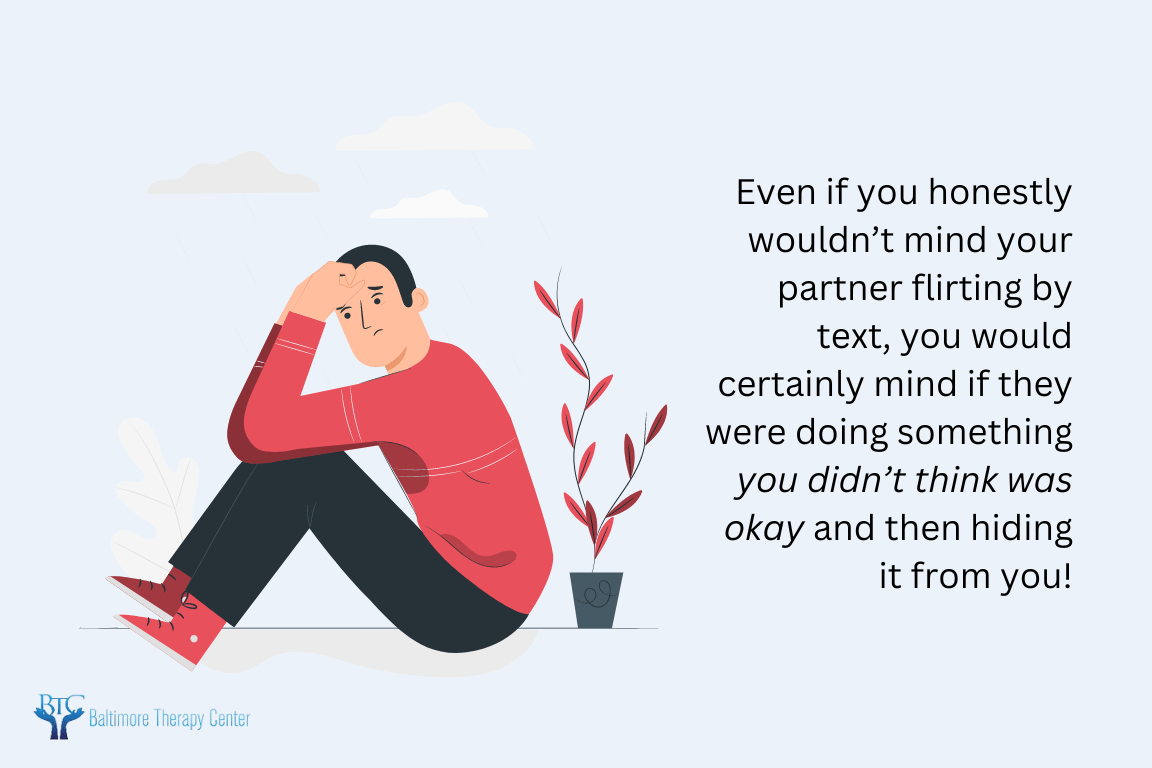Does Texting Count as Cheating?
- Raffi Bilek

- Jun 5, 2024
- 7 min read
Updated: Nov 23, 2025
Can interactions that take place via texting be considered cheating? It’s a tough question that doesn’t really lend itself to a simple yes or no answer.
The quick version, though, is this: it doesn’t really matter whether texting is actually cheating. The truth is that you get to define the boundaries of your marriage or relationship and what counts as a violation of those boundaries. That doesn’t mean your partner has to agree with you; it does mean you need to communicate about it (not just argue and defend).
Let’s dig a little deeper.
What Kind of Texting Are We Talking About?

First of all, there’s a range of possible ways this could be happening.
Let’s say you’re a woman in a relationship with a man. You discover he sent a message to a woman from work you’ve never heard of. And the message says, “what time is the meeting tomorrow?” Doesn’t seem like a major violation, right?
What if that woman turns out to be an ex-girlfriend of his. Cheating? Well… hard to call it that if all it’s about is a meeting at work. But still, a little uncomfortable, right? Especially if he’s never mentioned he’s working with an ex-girlfriend?
Of course, we can take this much further. What if there are clearly sexual texts there, or even nude pictures and the like? Big problem. But let’s say it’s with a person they have never met and could never meet and be physical with (like someone living in rural Mongolia or a paid sexting service).
Is that cheating? (I’m not saying it isn’t. I’m also not saying it is!)

There are shades of gray here. Maybe you are clear on where you’d want to draw the line. Maybe you’re not. But even if you are – is your partner on the same page?
You could be forgiven for never having hashed that out with each other. Most people don’t sit down at the outset of a relationship and discuss what they consider cheating and what they don’t!
When people think of infidelity, they usually assume it means people actually having sex or at least some kind of physical contact. In those cases, it’s usually a lot less gray. With the varying degrees of text infractions, where there isn’t any physical contact, it can be a lot harder to pin down.
So Is It Cheating or Not?
If you’re in the thick of a relationship crisis, you can certainly find websites out there that will give you the yes or no answer you’re looking for to “prove” something to your partner. But I submit that that won’t resolve the crisis in any meaningful way.
The real answer is that an individual can decide for themselves what they consider a violation of their marriage or relationship. I have worked with couples where merely having a friend of the opposite sex was offensive to one of the partners. And they are entitled to such a position!
That doesn’t mean their partner has to accept it. But if a couple cannot or will not agree on the boundaries of their relationship, this relationship may not be destined for ultimate success.

Since there is no one final answer to this question. Arguing about whether cheating has occurred or turning to the internet to prove to your partner that your opinion is the correct one is unlikely to get you anywhere.
So, if you’re in a relationship and your partner has been texting in a way that you find unacceptable, or if you’re the texter and your partner is upset with you – what do you do?
If You’ve Been Secretly Texting…
Let’s address each player here separately. We’ll start with the partner who’s been texting. Let’s assume your partner saw some text messages and is angry at you, accusing you of having an affair. Or, possibly, you’re involved in texting with someone in a way that leaves you wondering whether you’re doing something wrong.

Here are some questions to honestly ask yourself:
If you found your partner doing the same thing, would it bother you? If the answer is yes, you probably need to acknowledge that this is a relationship violation.
Does the person you’re texting with know you’re in a committed relationship? (This isn’t necessarily a guaranteed indicator since many people are unfortunately willing to engage sexually with someone who’s already taken. But if you have deliberately kept this fact from your texting pal, you are probably already aware that there’s something wrong with what you’re doing.)
The key question is probably this one: If you are doing something that you know your partner wouldn’t be happy with—whether you call it cheating or not—you are not doing right by your relationship.
A common objection to this last point is, “I’m not doing anything wrong here, but I know my partner would get all upset about it, so I didn’t want them to find out.”
If that’s your take, then first of all, please check in with yourself to make sure you’re not deluding yourself. If you’ve sent naked pictures of yourself to someone else, you probably know that you would not be happy with your partner doing the same thing.
And even if you are the rare person who truly wouldn’t mind, you are certainly aware that most people out there would. I think you will have a hard time convincing your partner otherwise. Claiming innocence in a situation like this probably won’t get you very far.
Self-Reflection

But let’s say what you did isn’t quite that extreme. You don’t think you’re doing anything so terrible, but you’re just trying to avoid an “overreaction.” Maybe you’re texting an ex-partner in totally nonsexual ways. Or you’re sending mildly flirtatious messages to someone in your friend group. And you truly believe you are not violating your relationship by doing so.
You still have the problem that you’re doing something you know your partner doesn’t like and you’re hiding it. Is that cheating?
Here’s the thing: it doesn’t matter. You’ve hurt your relationship, you’ve broken trust, and there needs to be some repair. Even if you honestly wouldn’t mind your partner flirting by text, you would certainly mind if they were doing something you didn’t think was okay and then hiding it from you!
Ultimately, the point is that your partner is hurt, and you need to take that seriously. That doesn’t mean you have to agree that you will never again talk to your ex, a member of the opposite sex, or any human being. But you do need to care about how your partner feels and come to an agreement together.
If Your Partner Has Been Texting

Let’s talk to the other partner now. You probably “caught” your partner texting in ways you consider inappropriate and are very hurt.
The best-case scenario is if your partner was actually not hiding it from you at all. (Hiding it might look like keeping their phone on them at all times, never leaving it on the table when they go to get a drink, putting a password on it or changing the password to one you don’t know, deleting all the messages from a text conversation, things like that.)
If nothing is happening that indicates that your partner was trying to hide their activity. And they tell you they honestly didn’t realize it would bother you (e.g., our example of totally nonsexual messages to an ex-partner), it probably makes sense to believe them. That doesn’t mean you can’t be hurt!
But it does take a lot of the sting out of it. If you’re allergic to sesame and your partner makes you sesame chicken for dinner, the meaning of that action changes an awful lot if they are aware of your allergy vs. if they are not, right?
If this is the situation, you can probably have a talk together where there’s a lot of understanding and open discussion. And you can get through this without much damage to the relationship. (You may still have a thorny question of what the boundaries in your relationship ought to be. In our example, whether it’s okay to stay in contact with ex-partners – which may not be so easy to resolve. If you’re having trouble working this out, a couples counselor can help.)
What If It Wasn’t So Innocent?

But what if you’ve discovered something that they’ve clearly been hiding on purpose? And what if they insist they didn’t cheat on you because “nothing physical happened?” (If they do acknowledge that what they’ve done is considered cheating, there’s a serious issue to work through, but the question of whether infidelity has occurred isn’t the big one here.)
The solution here is not to try to debate or convince your partner that what they’ve done is officially called cheating. Instead, you can let them know that regardless of whether it is or isn’t, you are hurt by what they’ve done.
Even if they truly believe that they haven’t done anything wrong and were just hiding it because they knew you’d be upset – that is itself a breach of the relationship. The same thing would be true if, for example, they spent a lot of money on a purchase – a vehicle, an item of jewelry, a big-screen TV – and hid it from you because they knew you wouldn’t be happy with it. That situation may carry less of the intensity that comes with a sexual violation. But it’s a breach of trust nonetheless.
Summary
Don’t get caught up in what you call this incident, and don’t attack or label your partner. Focus instead on sharing your feelings of betrayal, insecurity, anger, or whatever else you are feeling. A caring response on their part will involve empathy and remorse. A selfish response will sound like defensiveness, denial, and self-righteousness.
If what you get is the second kind of response, all is not lost. Again, couples counseling can definitely help you through this difficult situation. (It would likely be helpful even if the response you get is pretty understanding.)
At the end of the day, this is going to be about communication. Deciding who is right and who is wrong in the situation won’t make your relationship better. Talking about it in a healthy way will.
Need some help with that? We got you covered.




Comments